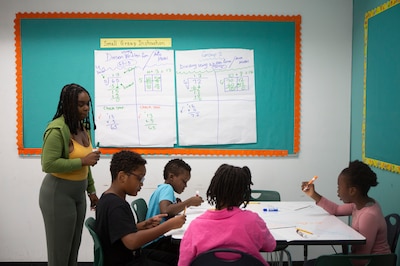Sign up for Chalkbeat Newark’s free newsletter to keep up with the city’s public school system.
Newark Public Schools’ state test scores went up 2 percentage points in both math and English language arts this year, according to data released by the district.
On average, 15% of Newark students in grades 3 to 9 passed math assessments while about 29% passed English language arts tests, spring 2023 New Jersey Student Learning Assessment preliminary scores show. Additionally, English language arts scores did not increase this year for Newark third graders, a grade considered critical for long-term success in literacy.
This year’s new state scores, only the second since 2019, highlight Newark students’ slow recovery from the disruption of remote learning. Last year, district officials implemented tutoring and other academic recovery measures after 2022 state scores showed dismal drops that Superintendent Roger León called “horrible” at the time — passing rates of 13% in math and 27% in English language arts.
The state’s Department of Education has not yet released statewide scores.
“We’re coming out of a unique and historic window caused by the pandemic. And students have been seen to have lost a lot of ground in regard to their achievement,” said Rochanda Jackson, executive director of the Office of Policy, Planning, Evaluation, and Testing, who presented the scores at a school board meeting last week.
Many of the trends in Newark — such as a large decline in math scores — are on par with national trends. Test scores in 2022 and this year show results were still behind pre-pandemic levels. In 2019, about 26% of Newark students passed the math test and roughly 36% passed English language arts.
And as schools across the country continue to reel from the effects of the pandemic, marginalized students, such as those from low-income families and different ethnic and racial groups, are among the hardest hit and remain the furthest from recovery.
“I want everyone to understand that the impacts of the pandemic are very real,” said León during last week’s presentation.
Third-grade reading levels remain stagnant
While about 29% of Newark Public School students passed their English language arts tests, only 19% of third graders passed the assessment this year, the lowest of any grade in the city for a second year in a row.
Experts say reading is part of a developmental process that starts at a young age and impacts a child’s likelihood of graduating high school, pursuing college, and ultimately a career. Reading proficiency levels among Black third graders in public schools started to decline in 2019, even before the pandemic, according to a report by The Racial Equity Initiative.
Last year’s initial drop prompted local groups like JerseyCAN, a statewide organization advocating for high-quality public school education, to urge state leaders to develop a plan to improve literacy in public schools. In July, Mayor Ras Baraka launched a 10-point Youth Literacy Action Plan that called on the city’s community partners and programs to get young children reading and writing amid low state test scores.
This year’s scores are “unacceptable,” said Paula White, executive director of JerseyCAN.
“The warnings that began shortly after the pandemic have now escalated to real-time results, with Newark children being deeply affected,” White said.
Among all grade levels, seventh and eighth graders had the highest English language arts scores, each at about 37%, and the greatest increases, surpassing the district’s passing rate. Seventh grade scores increased this year by about 4 percentage points and eight grade scores by roughly 5 percentage points.
In grades 3, 4, and 6 the passing rates remained the same at about 19%, 22%, and 26% respectively.
“Any effort short of overhauling the district’s literacy infrastructure will not work. Newark is in crisis, and we owe it to our children to review every area of the learning process, from teacher training to actually developing a new curriculum,” White added.
Among the district’s 41 elementary schools, 26 increased their proficiency rates in English language arts in comparison to last year’s results. Ten high schools also increased their passing rates in the same subject from last year with five schools increasing their scores by at least 5 percentage points or more.
Of more than 39,000 students across 41 elementary schools, 3,538 students across 41 schools increased their English language arts proficiency levels since 2022, according to Jackson.

Math scores are “the biggest lift” ahead
Newark public school officials have “the biggest lift” in helping students refine their math skills, said León during last week’s presentation.
The overall math passing rate increased from 13% to 15% with grades 3, 4, 7, and 9 surpassing the district average this year by 1 to 8 percentage points.
“The increase in math performance, overall nominal, is there,” Jackson added.
This year, third and fourth graders increased their scores by 4 and 5 percentage points respectively, and sixth and seventh grades each by around 2 percentage points.
Among the district’s 41 elementary schools, 27 increased their math passing rates. Of those, six increased their proficiency levels by at least 5 percentage points. Eight high schools also increased their passing rates this year and of those, three did by at least 5 percentage points.
Jackson said it is important to track student recovery and proficiency increases from one level to another as the district continues to work to address learning loss.
Of more than 39,000 students, 3,146 moved up in math levels since 2022.
District works to address student learning loss
In an effort to improve student achievement, the district has created new curriculums, placed an emphasis on student attendance, and pushed for tutoring at least three times a week.
“It’s extremely important that students are taking advantage of tutoring opportunities,” León added during Thursday’s school board meeting when the results were presented.
Last year, León emphasized the district’s Excel after-school program for grades K-8 as a way to address student trouble areas in reading, writing, math, and other subjects. This year the district also mandated roughly 10,000 public school students attend summer school in an effort to refine critical skills amid low state test scores.
After Jackson’s presentation, board member Crystal Williams was the only member to ask a question about the district’s strategy to improve student performance. León said the district’s program and instruction committee would discuss plans and goals for the year for English language arts when the committee meets in October.
Also in response to William’s question, board member A’Dorian Murray-Thomas said the district aims to reach a “30%” passing rate in the math test by next year, double the number of this year’s 15% math passing rate.
Williams called this year’s results “alarming” on Thursday.
“I would be upset if my child didn’t rank proficient. I just want to know what the plan is,” Williams added.
Jessie Gómez is a reporter for Chalkbeat Newark, covering public education in the city. Contact Jessie at jgomez@chalkbeat.org.






